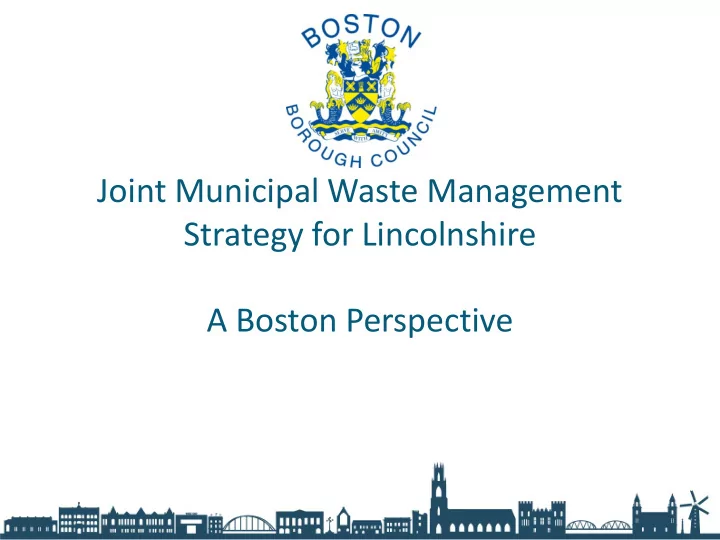

Joint Municipal Waste Management Strategy for Lincolnshire A Boston Perspective
Waste Management arrangements in Boston & Lincolnshire Waste Disposal and Waste Collection, who does what? - Residual waste (green bin) - Dry recycling (blue bin) - Garden Waste (brown bin) The Lincolnshire Waste Partnership (LWP)
Strategic challenges for Boston • Recycling rates are declining – in Lincolnshire, down from 52.9% in 2010/11, to 46.7%, in 2016/17 • Boston has 3 rd Lowest recycling rate of all districts at 37.6%,. (national average 44.3%) 2016/17. • Residual waste per household is increasing in Lincs , 496 kg’s in 2010/11 to 561 kgs in 2016/17 • Boston performance on residual waste per household is poorest of all districts at 597 kgs (528 kgs exc. HWRC) • Recycling contamination rates highest in the county (equal only to Lincoln) at 35%, (33% January 2018) • No district achieves <30%.
Strategic challenges for Boston Continued…… • Overall tonnage of waste collected in Boston has increased by 5.35% or 1,500 tonnes since 2013/14 (c.28,000t total) • Forecast population growth of 4.6% (2011 census 64,637, mid year est.2016 67,600). 4.2% Lincolnshire. • New homes , additional 900 homes built between 2013-2017 plus a further 1,900 homes in the pipeline to 2022 • Managing costs of municipal waste services within the county and disposal capacity
Strategic opportunities for Boston What we must seek to achieve through the JMWMS: • Improve our recycling performance • Reduce household residual waste • Reduce contamination in recycling • Divert or recycle new waste streams eg plastic film, textiles, food waste • Managing the ‘whole cycle costs’ of waste
What could the future look like for waste and recycling services in Boston? Maximising opportunities will require a fundamental shift in current service arrangements: • Collection of food waste • Harmonising recycling streams • New collection methods & vehicles • Collection frequencies • Communication & education of residents • Enforcement response • Growing our commercial waste service
Learning More about our Waste Do members wish to learn more through visits to?: Waste Transfer Station , LCC, Slippery Gowt Lane, Boston Materials Recycling Facility , Mid UK Recycling, Barkston Energy from Waste facility , FCC, North Hykeham, Lincoln
Q & A session Introducing your hosts: • Councillor Eddy Poll – Chair of Lincolnshire Waste Partnership & Lincolnshire County Councillor • Councillor Mike Brookes – Portfolio Holder for Environment, Boston BC • Councillor Mike Cooper – Leader, Boston BC
Recommend
More recommend